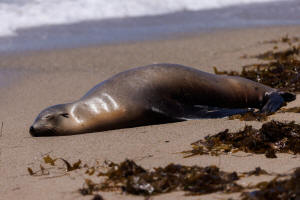Sick sea lions washing ashore in California due to algae bloom
 Send a link to a friend
Send a link to a friend
 [June 27, 2023]
By Omar Younis [June 27, 2023]
By Omar Younis
LOS ANGELES (Reuters) - Rescued from the beach, a sick sea lion and her
newborn pup are now on the mend with dozens of others at a marine mammal
care center, part of effort by California wildlife experts responding to
a sudden surge in animals falling ill to a neurotoxin.
Experts say a recent outbreak of algae bloom - commonly known as red
tide - has sickened and killed an unknown number of sea lions and
dolphins.
Marine biologists are paying close attention because they consider sea
lions a sentinel species - animals that can help identify environmental
risks to humans.
"It started as a trickle. In the first week we had 12 animals. Then in
the next week we were up to 60 plus animals, so it happened relatively
quick," said John Warner, chief executive of the Marine Mammal Care
Center in the coastal Los Angeles neighborhood of San Pedro.
The center is one of several California organizations to nurse the
animals back to health. The Channel Islands Marine & Wildlife Institute
reported 1,000 sightings of sick and dead marine mammals from June 8
through 14.
The algae is a natural phenomenon that causes the production of a
neurotoxin called domoic acid, but the blooms can also proliferate
because of human causes such as climate change and an excess of nitrates
washed out to sea, experts say. Similar events occurred in California
five other times since 2002.

Small fish consume the toxin and pass it up the food chain. Humans are
unaffected unless they eat infected shellfish.
[to top of second column]
|

A sick sea lion is marked with paint and
left on a beach, unable to be rescued due to overcrowded facilities,
as toxic algae is being blamed for causing sickness to sea lions and
dolphins along the coast of Southern California, in Redondo Beach,
California, U.S., June 23, 2023. REUTERS/Mike Blake

Sea lions are a fixture on many California beaches, sunning on the
shoreline, barking at each other, and sometimes looking for an easy
meal from tourists.
But the sick ones will sway their heads back and forth, foam at the
mouth, or experience seizures. Some just lie listlessly in the surf.
The pup was born on nearby Hermosa Beach last week to a sick mother
that is receiving fluids while the pup is nursing.
"The mom was having seizures at the waterline. The pup was on the
beach. We had lovely volunteers, great partners with our lifeguards
and beach and harbor who cordoned the animal and the pup off until
we were able to get there," Warner said.
They will remain at the center 30 to 60 days before being released
in the wild.
"That's our ultimate goal with all of these animals," Warner said.
(Reporting by Omar Younis; Writing by Daniel Trotta; Editing by
Lincoln Feast.)
[© 2023 Thomson Reuters. All rights
reserved.]This material may not be published,
broadcast, rewritten or redistributed.
Thompson Reuters is solely responsible for this content. |